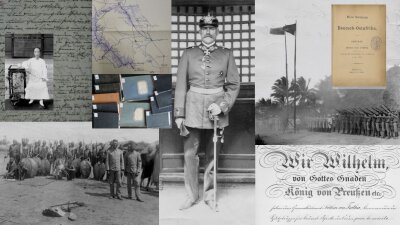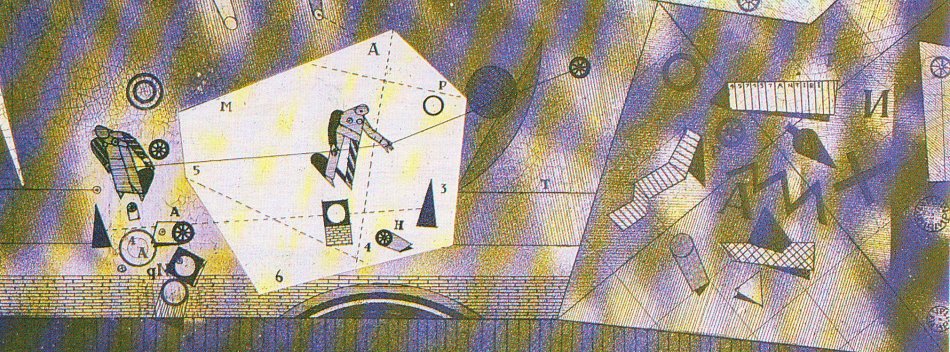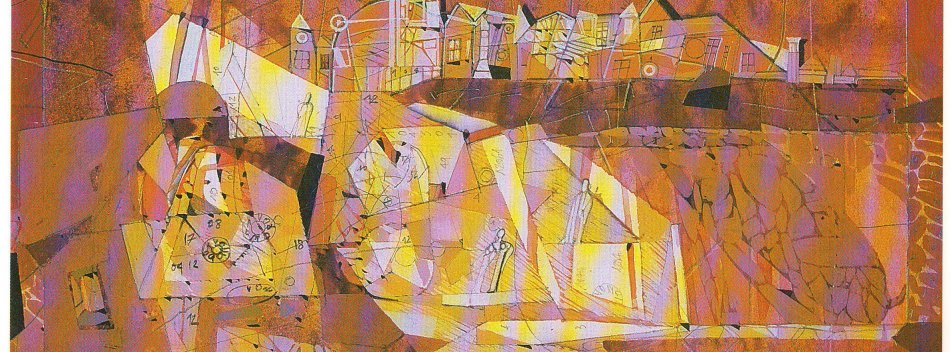
Learning Grounds of Genocide
Lothar von Trotha's diaries from German East Africa (1894/97) and China (1900/01)
Foundet by the Deutsche Forschungsgemeinschaft (DFG)
The aim of this project is to provide a critical edition of Lothar von Trotha’s hitherto unknown diaries from his assignments, first, as commander of the “Kaiserliche Schutztruppe für Deutsch-Ostafrika” and deputy governor of German East Africa from 1894 to 1897, and secondly, as commander of the “1. Ostasiatische Infanteriebrigade” during the so-called Boxer Rebellion in China in 1900 and 1901. These diaries, comprising some 3,200 written pages, were kept, together with photographic material, in the von Trotha family archive where the applicants discovered them while exploring Lothar von Trotha’s estate (s. EC 410/6-1). The extensive handwritten and photographic documents constitute sources of extraordinary relevance for the historiography of German colonial expansion as a whole, as these personal records provide an unprecedented reflection of the experiences of a top functionary and present vividly the violence of German colonial expansion, which ultimately gave rise to the first genocide of the 20th century in German South-West Africa in 1904.
This edition project seeks to provide the scientific community and a wider audience with unique source material, which promises to further significantly our knowledge of German colonialism in various respects: firstly, in terms of the historiography of German East Africa as well as the Boxer Rebellion which, conceptualized as "learning grounds of genocide”, can shed new light on the unleashing of extreme violence in German South-West Africa, and secondly, regarding German colonial history as a whole. Lothar von Trotha's career represented an "imperial biography" (David Lambert) par excellence, linking heterogeneous territories within Imperial Germany and overseas, thus rendering the German (colonial) Empire tangible as a coherent whole.
IDG-Publications relevant to the project:
• Lothar von Trotha in Deutsch-Südwestafrika, 1904-1905. Bd. I: Das Tagebuch (328 Seiten) / Bd. 2: Das Fotoalbum (327 Seiten), Berlin u.a.: De Gruyter 2024 (M. Häussler / A. Eckl).
• An Unresolved Issue : Genocide in Colonial Namibia, ed. by Andreas Eckl and Matthias Häussler with Martha Akawa-Shikufa, Windhoek: Friedrich-Ebert-Stiftung 2024, 403 pages (Open Access: https://library.fes.de/pdf-files/bueros/namibia/21437.pdf)
• A Visual Narrative of Genocide? Lothar von Trotha’s photo album as seen against the backdrop provided by his Diary, in: An Unresolved Issue : Genocide in Colonial Namibia, ed. by Andreas Eckl and Matthias Häussler with Martha Akawa-Shikufa, Windhoek: Friedrich-Ebert-Stiftung 2024, pp. 69-99 (A. Eckl)
• From the ‘Uprising of the Herero’ to the ‘OvaHerero and Nama Genocide’. About the Discourse History of an Event of Mass Murder, in: An Unresolved Issue: Genocide in Colonial Namibia, hrsg. von Andreas Eckl und Matthias Häussler mit Martha Akawa-Shikufa, Windhoek: Friedrich-Ebert-Stiftung 2024, S. 241-257 (M. Brehl)
• “Race Warrior”? Lothar von Trotha in German South-West Africa (1904–1905), in: An Unresolved Issue : Genocide in Colonial Namibia, ed. by Andreas Eckl and Matthias Häussler with Martha Akawa-Shikufa, Windhoek: Friedrich-Ebert-Stiftung 2024, pp. 101-117 (M. Häussler)
• "Aus unseren Händen kommt kein Herero lebend". Genozidale Mord(s)lust im Krieg gegen Herero 1904/05, in: Zeitschrift für Genozidforschung 22, 1, 2024, S. 81-110 (A. Eckl)
• Staatlichkeit und Gewalt im kolonialen Namibia (1883–1915). Akteure und Prozesse, Weilerswist: Velbrück Wissenschaft 2024 (224 Seiten) (M. Häussler)
• Du « soulèvement des Hereros » au génocide perpétré sur les OvaHereros et Namas. Considérations sur le récit d’un génocide, in: Revue d’Allemagne et des pays de langue allemande, Vol. 55 (1), 2023, S. 9-24. (M. Brehl)
• Krieg und Genozid in Deutsch-Südwestafrika, hrsg. von Andreas Eckl und Matthias Häussler Weilerswist: Velbrück Wissenschaft 2022 (=Zeitschrift für Genozidforschung 20, 2, 2022).
• »Musik und Poesie ist nichts, Arimetik ist Alles«. Lothar von Trothas »Bilder aus dem Krieg in Südwestafrika« – ein visuelles Narrativ des Genozids?, in: Krieg und Genozid in Deutsch-Südwestafrika, hrsg. von Andreas Eckl et Matthias Häussler Weilerswist: Velbrück Wissenschaft 2022 (=Zeitschrift für Genozidforschung 20, 2, 2022), S. 175-203 (A. Eckl).
• »Rassekämpfer«? Lothar von Trotha in Deutsch-Südwestafrika (1904-1905), in: Krieg und Genozid in Deutsch-Südwestafrika, hrsg. von Andreas Eckl et Matthias Häussler Weilerswist: Velbrück Wissenschaft 2022 (=Zeitschrift für Genozidforschung 20, 2, 2022), S. 204-220 (M. Häussler).
• Dekolonisieren heißt differenzieren. Die komplexe Vernichtungsgeschichte der OvaHerero und Nama, in: Blätter für deutsche und internationale Politik, 10, 2021, S. 113-120 (A. Eckl, M. Häussler).
• The Herero Genocide. War, Emotion, and Extreme Violence in Colonial Namibia. Oxford und New York: Berghahn Books 2021 (M. Häussler).
• „S’ist ein übles Land hier.“ Tagebuchaufzeichnungen aus dem Herero-Krieg in Deutsch-Südwestafrika 1904 von Georg Hillebrecht und Franz Ritter von Epp, Bochum: Welwitschia Verlag (Neuauflage in zwei Einzelbänden) 2021 (zuerst: Köln 2004) (A. Eckl)
• "Man wird wohl später sich schämen müssen, in China gewesen zu sein". Tagebuchaufzeichnungen des Assistenzarztes Dr. Georg Hillebrecht aus dem Boxerkrieg 1900 – 1902, Bochum: Welwitschia Verlag, 2021 (zuerst: Essen 2006) (A. Eckl).
• The Herero and Nama in German South-West Africa (1830–1910). In: Helbling, Jürg/ Schwoerer, Tobias (Hg.): The Ending of Tribal Wars Configurations and Processes of Pacification, New York und London: Routledge, S. 56-80 (M. Häussler).
• Empire and Genocide. In: Bloxham, Donald/ A. Dirk Moses (Hg.): The Oxford Handbook of Genocide Studies. 2. Aufl., Oxford: Oxford University Press 2021 (M. Häussler mit Andreas Stucki und Lorenzo Veracini).
• Narratives of genocide: Lothar von Trotha’s written and photographic legacy. A critical edition in preparation, zusammen mit Matthias Häussler, in: Journal of Namibian Studies, 28, 2020, S. 93-102 (A. Eckl, M. Häussler).
• „Scheißdreck ist Trumpf”. Gerhard von Brünneck’s diary entries and letters from South West Africa, Mai – August 1904, in: Journal of Namibian Studies, 28, 2020, S. 117-125 (A. Eckl).
• „Hide my children”. Samuel Maharero’s letter to the Resident Magistrate, 28 September 1904, in: Journal of Namibian Studies, 27, 2020, S. 125-133 (A. Eckl, M. Häußler und Jekura Kavari).
• „Fort mit Trotha!” A series of articles in the Vorwärts in August 1905 on Lothar von Trothas edict ‘Words to the Ovaherero people’ also known as ‘extermination order’, in: Journal of Namibian Studies, 26, 2019, S. 109-118 (A. Eckl).
• Letter diary of Adolf Auffahrt, Zahlmeister in the Kaiserliche Schutztruppe for South West Africa, December 1904 – April 1905, in: Journal of Namibian Studies, 25, 2019, S. 101-119 (A. Eckl).
• Oomambo wandje komuhoko wOvaherero. Lothar von Trotha’s ‘Words to the Ovaherero people`, Journal of Namibian Studies, 23, 2018, S. 125-133 (A. Eckl, M. Häussler und Jekura Kavari).
• Der Genozid an den Herero. Krieg, Emotion und extreme Gewalt in ‚Deutsch-Südwestafrika‘. Weilerswist: Velbrück Wissenschaft 2018 (M. Häussler).
• „Collaboration” or Sabotage? The Settlers in German Southwest Africa between Colonial State and Indigenous Polities. In: Bührer, Tanja/ Eichmann, Flavio/ Stuchtey, Benedikt (Hg.): Cooperation and Empire. Oxford und New York: Berghahn Books 2017, S. 169-193 (M. Häussler).
• Narrative der Vernichtung um 1900, in: Knocke, Roy/ Glöckner, Olaf (Hg.): Das Zeitalter der Genozide. Ursprünge, Formen und Folgen politischer Gewalt im 20. Jahrhundert, Berlin: Duncker und Humblot 2017, S. 239-252 (M. Brehl).
• Warum die Herero mit den Deutschen kooperierten. Zur ‚Pazifizierung’ einer akephalen Gesellschaft. In: Mittelweg 36, 24/4, S. 86-108 (M. Häussler).
• „Kultur der Grausamkeit“ und die Dynamik „eradierender Praktiken“. Ein Beitrag zur Erforschung extremer Gewalt. In: Sociologus, 63 (2013), 147-169 (M. Häussler).
• Zwischen Vernichtung und Pardon: Die Konzentrationslager in „Deutsch-Südwestafrika“ (1904-08). In: Zeitschrift für Geschichtswissenschaft, 61 (2013), 7/8, S. 601-620 (M. Häussler).
• Figures of Disintegration. „Half-Castes“ and „Frontiersmen“ in German Colonial Literature on South-West Africa, in: Journal of Namibian Studies 12, 2012, S. 7-27 (M. Brehl).
• Diskursereignis „Herero-Aufstand“. Konstruktion, Strategien der Authentifizierung, Sinnzuschreibungen, in: Warnke, Ingo H. (Hg.): Deutsche Sprache und Kolonialismus. Aspekte nationaler Kommunikation 1884/85-1919, Berlin/New York NY: de Gruyter 2009, S. 167-202 (M. Brehl).
• The Herero genocide of 1904: Source-critical and methodological considerations, in: Journal of Namibian Studies. History, Politics, Culture, 3, 2008, S. 31-61 (A. Eckl).
• „The drama was played out on the dark stage of the sandveldt“. The destruction of the Herero and Nama in German (popular) Literture, in: Zimmerer, Jürgen/ Zeller, Joachim (Hg.): Genocide in German South-West Africa. The Colonial War of 1904-1908 and its aftermath, Monmouth: Merlin Press 2008, S. 100-112 (M. Brehl).
• Vernichtung der Herero. Diskurse der Gewalt in der deutschen Kolonialliteratur, München: Wilhelm Fink 2007 (M. Brehl).
• Konzeptionen katholischer und evangelischer Missionsphotographie. Bilder aus der südwestafrikanischen Herero-Mission und der nordbrasilianischen Mundurukú-Mission, in: Günter Bernhardt, (Hrsg.), Die Ferne im Blick. Westfälisch-lippische Sammlungen zur Fotografie aus Mission und Kolonien, Münster, 2006, S. 114-137 (A. Eckl).
• „Ora et labora.“ Katholische Missionsfotografien aus den afrikanischen Kolonien, in: Marianne Bechhaus-Gerst und Sunna Gieseke, (Hrsg.), Koloniale und postkoloniale Konstruktionen von Afrika und Menschen afrikanischer Herkunft in der deutschen Alltagskultur, Frankfurt/Main u.a., 2006, S. 231-249 (A. Eckl).
• „Zu leben, nur um da zu sein, hat niemand ein Recht.“ Der Kolonialkrieg mit dem Volk der Herero 1904 im Spiegel kolonialpropagandistischer Literatur der NS-Zeit, in: Christof Hamann, (Hrsg.), Afrika – Kultur und Gewalt. Hintergründe und Aktualität des Kolonial-krieges in Deutsch-Südwestafrika. Seine Rezeption in Literatur, Wissenschaft und Populärkultur (1904–2004), Iserlohn, 2005, S. 159-189 (A. Eckl).
• Strategies of Exclusion: The Genocide of the Herero in German Colonial Discourse, in: Kinloch, Graham C./ Mohan, Raj P. (Hg.): Genocide: Approaches, Case Studies and Responses, New York NY: Algora 2005, S. 143-162 (M. Brehl).
• National-koloniale Konstruktionen in politischen Entwürfen des Deutschen Reichs um 1900, in: ders./ Gründer, Horst/ Ketelsen, Uwe-K. (Hg.): Kolonialismus. Kolonialdiskurs und Genozid, München: Wilhelm Fink 2004, S. 19-66 (M. Dabag).
• „Ich denke, die haben Ihnen zum Tode verholfen“. Koloniale Gewalt in kollektiver Rede, in: ders./ Gründer, Horst/ Ketelsen, Uwe-K. (Hg.): Kolonialismus. Kolonialdiskurs und Genozid, München: Wilhelm Fink 2004, S. 185-215 (M. Brehl).
• „Diese Schwarzen haben vor Gott und Menschen den Tod verdient“. Der Völkermord an den Herero 1904 und seine zeitgenössische Legitimation, in: Völkermord. Genozid und Kriegsverbrechen in der ersten Hälfte des 20. Jahrhunderts, hrsg. im Auftrag des Fritz Bauer Instituts von Irmtrud Wojak und Susanne Meinl, Frankfurt am Main: Campus 2004, S. 77-97 (M. Brehl).
• German and Portuguese colonial ambitions as mirrored in early pictorial documents from the Kavango Region, in: Wolfram Hartmann, (ed.), Hues between black and white. Historical photography from colonial Namibia 1860s to 1915, Windhoek, 2004, S. 185-210 (A. Eckl).
Academics:
Dr. Andreas Eckl
Tel.: +(0)234.32.19862
Mail: andreas.eckl@rub.de
Dr. Dr. Matthias Häussler
Tel.: +(0)234.32.19862
Mail: matthias.haeussler@rub.de





